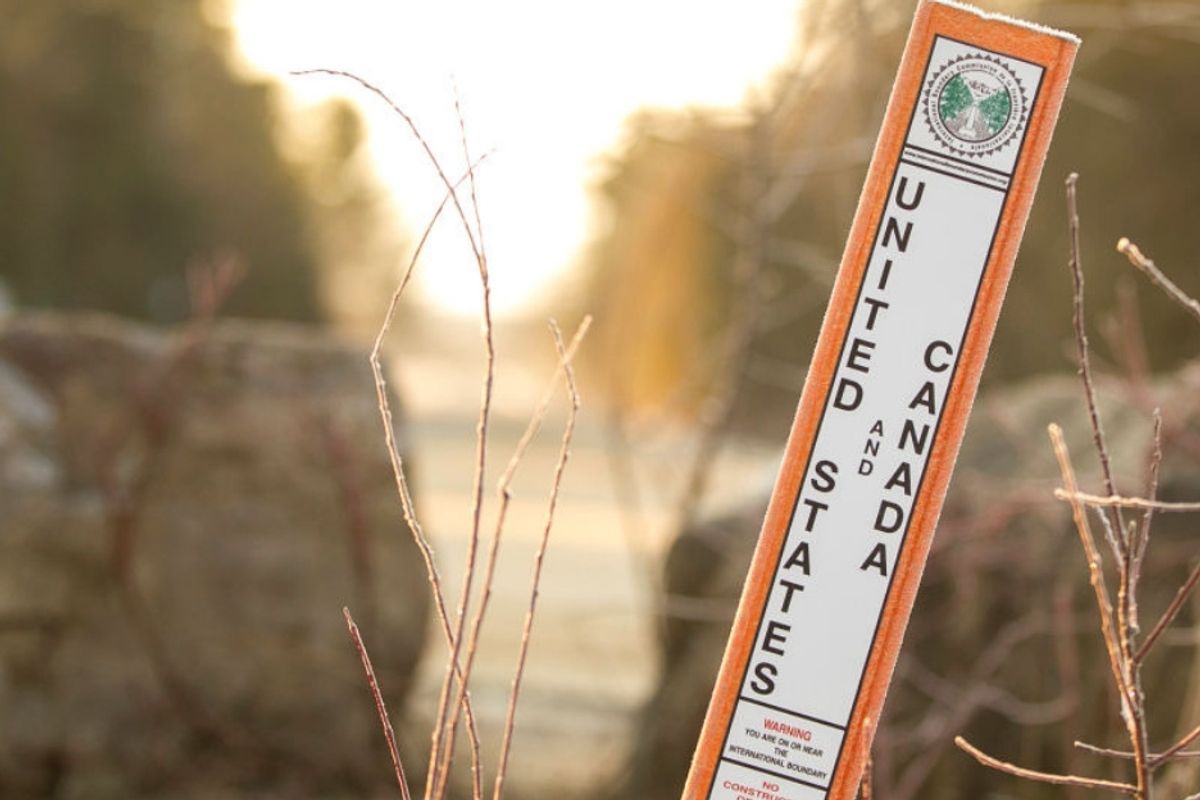I didn’t realize how psychologically oppressive the U.S. had become. Then I crossed the border and exhaled.

I had a strange experience in the Vancouver, B.C. airport last week that I can't stop thinking about.
I was on my way to the Women Deliver conference—the largest international conference on the rights, health, and well-being of women and girls. As a woman and an American, I was excited to be immersed in conversations about improving gender equality globally. I was excited to meet people leading movements to improve the lives of women and girls around the world. Justin Trudeau, Melinda Gates, Tarana Burke, and other major movers and shakers were going to be there. The conference had been sold out for months.
As I made my way through customs at the Vancouver airport, I expected to feel some excitement about being there. I did not, however, expect to feel what I felt as I left the terminal.
The signs for exiting the Vancouver airport don't say "Exit," they say "Way Out." And as I walked toward the Way Out sign, something about those two words and the realization that I had just left American soil hit hard. A wave of unexpected emotion washed over me.
Relief.
Scenes from The Handmaid's Tale—of people fleeing the hellscape the U.S. had become and seeking asylum in Canada—flashed through my mind. A mere few years ago, such scenes would have felt like far-fetched fiction. But walking toward the Way Out signs in the Vancouver airport, it felt too close to home. For a moment, I had an urge to run toward those signs like my life depended on it. To run toward sanity—toward freedom.
We have "American freedoms" drilled into us from the time we're children. Right now, it feels like a lie.
I hadn't fully realized how psychologically oppressive the U.S. had become until I left it, even just temporarily. The steady drip of regressive policies, the erosion of facts and denial of science, the resurgence of racist and nationalist movements, the daily insanity coming from the highest levels of our government, and the intensely polarized atmosphere here has worn on me more than I realized.
And I'm generally a super positive person. Seriously, I'm like the Pollyanna of politics—if I'm struggling here, what are other people feeling? (I'm also a middle-class white lady whose privilege has prevented me from fully grasping the fear and angst marginalized communities have been feeling for, well, ever. I'm well aware that I'm late to the game of uncertainty.)
Stepping into Canada, I felt like I could fully exhale for the first time in several years, only I didn't even know I had been holding my breath. Ironically, leaving "the land of the free" gave me a keen feeling of freedom and a sense of safety I didn't know I'd lost. I never expected to feel that way leaving my own country.
My internal dialogue has always been, "America, I love you. You aren't perfect, but your positives outweigh your negatives." Now it's, "America, I want to love you. But it's clear that our relationship has become toxic and I'm not sure how much longer I can do this."
Attending a women's rights conference as an American right now was surreal.
The Women Deliver conference was a powerful four days filled with people from 165 countries working to empower women and fight for their health and well-being. Heads of international aid organizations, heads of women's associations, heads of movements, heads of state, and thousands of others all gathered together to discuss the state of the world's women and girls.
And you want to know the biggest contribution my country made to that conversation? A litany of regressive policies and legislation that prompted a collective, international rallying cry: "We refuse to go backwards."
I got to see some of the ways our current policies affect women not just in the U.S., but outside of it. For example, I was embarrassed by our reimplementation and expansion of the "global gag rule," which removes funding from any organization that so much as mentions abortion—even in countries where abortion is legal—and puts the lives of women and girls at risk.
I don't think most average Americans understand how harmful the global gag rule is. I watched a woman from Kenya share her story of escaping female genital mutilation at age 8. I heard from a woman in Pakistan who escaped child marriage at 11 years old. I watched an 18-year-old from Nigeria who had been kidnapped by Boko Haram at 14 and repeatedly raped until she escaped at 16—eight months pregnant. The organizations that helped these girls focus their work on sexual and reproductive health, including ending child marriage and genital cutting, educating communities on safe sex, and providing resources to prevent unwanted pregnancy. And if any such organization were to inform a child bride whose body would be ravaged by childbirth or a Boko Haram escapee impregnated by violence that abortion was one possible option for them, they would lose all funding from the U.S.
That is criminal. And it is happening. And it's just one backwards policy America is responsible for.
However, I left the conference—and Canada—with a strong sense of hope.
One thing stepping out of the U.S. and meeting agents of change from around the world showed me was that there are so many incredible people doing important, world-changing work out there. The Maasai woman who has helped save 17,000 girls from genital cutting by helping transform coming-of-age rituals into celebrations of girls' hopes and dreams, for example. Or the 18-year-old Zambian girl who earned a standing ovation from four heads of state after eloquently calling out politicians for being all talk and no action. Or the organizers who pulled together all of these individuals to help women support one another, to stand in their power wherever they live.
I returned to the U.S. not with a sense of dread, but with a sense of purpose. Women are making waves in the world, pushing back against centuries of inequality and patriarchal norms. Naturally, there will be pushback against that pushback, but we will not go backwards.
Everything isn't okay, and we are living in strange times. But there are positive things happening. Old systems have to be broken down in order to build something new. Sometimes a step back clears the way for two steps forward. I have to believe that's where we are right now—poised for a great leap into a better future, where all of us feel free and safe on our own soil.



 Teens hanging out in a living room.via
Teens hanging out in a living room.via  Teenagers eating pizza.via
Teenagers eating pizza.via  Teenagers eating pizza.via
Teenagers eating pizza.via 

 Student smiling in a classroom, working on a laptop.
Student smiling in a classroom, working on a laptop. Students focused and ready to learn in the classroom.
Students focused and ready to learn in the classroom.
 Abraham Lincoln portrait by Alexander Gardner in 1865.
Abraham Lincoln portrait by Alexander Gardner in 1865.
 Fish find shelter for spawning in the nooks and crannies of wood.
Fish find shelter for spawning in the nooks and crannies of wood.  Many of these streams are now unreachable by road, which is why helicopters are used.
Many of these streams are now unreachable by road, which is why helicopters are used. Tribal leaders gathered by the Little Naches River for a ceremony and prayer.
Tribal leaders gathered by the Little Naches River for a ceremony and prayer.